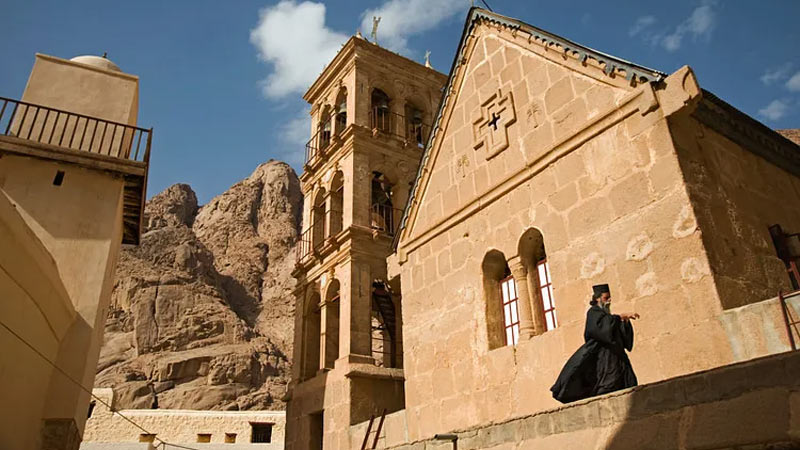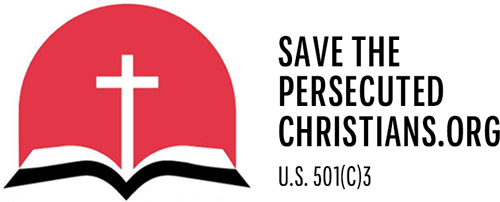Egypt’s War Against the World’s Oldest Christian Monastery

The state’s suppression of St. Catherine’s is a microcosm of Egypt’s broader campaign against the country’s Christians—including my family.
By Mariam Wahba | The Free Press | Aug 17, 25
St. Catherine’s Monastery, 275 miles from Cairo in the depths of the Sinai desert, is the world’s oldest continuously inhabited Christian monastery. It is also one of Christianity’s oldest institutions, built at the foot of the mountain where Moses is believed to have seen the burning bush and subsequently received the Ten Commandments. Run by Greek Orthodox monks—some 25 of them live there today—it has served as a sanctuary of worship, refuge, and scholarship for more than 1,500 years.
I grew up in Egypt’s Coptic Christian community; once a year my church would pile us into a bus for our annual pilgrimage to the monastery. But the standing of this holy place is now at grave risk.
In May, an Egyptian court ruled that the monastery’s monks are mere “occupants,” allowing the state to essentially take control of what is—and is not—allowed at St. Catherine’s, and stripping the monks of all legal authority. With enough pressure, they may be forced to abandon the monastery altogether.
When the Greek foreign minister sat down with his Egyptian counterpart earlier this month, they faced a quiet standoff over exactly this possibility. The outcome of this fight will signal whether Egypt still makes room for religion that is outside state control.
Over the last decade, Cairo has steadily chipped away at St. Catherine’s autonomy—a microcosm of Egypt’s broader campaign against the country’s estimated 10 to 15 million Christians in the majority Sunni Muslim nation.
St. Catherine’s significance lies not just in its history, but in its unparalleled manuscript collection, which rivals the Vatican’s with a continuous record stretching back centuries.
For decades, researchers have been able to study its manuscripts with approval from the monks. The government, however, seized control over academic access to the site in 2023, revoking the monastery’s long-standing authority to oversee the research.
Since the government takeover, the new state-run system has yet to approve a single research request.
Cairo also canceled an important, ongoing project to digitize the manuscripts that entailed collaboration among the monastery, UCLA, and an American NGO called the Early Manuscripts Electronic Library. In early 2024, Egyptian authorities denied a group of visiting scholars entry to the monastery’s library, including an American who had worked closely with the monks for years. No explanation was ever given for these steps.
Together, these moves have undermined the monastery’s autonomy and effectively sidelined the monastic community that has preserved the site for centuries. Though worship is still allowed, scholarship has stalled, and the government has hollowed out the monastery’s religious stewardship.
The legal logic for these steps stems from antiquities laws passed in the 1970s that gave the Egyptian state ownership over archaeological sites. But St. Catherine’s had long been the exception. A 1974 presidential decree granted Egyptian citizenship to the monastery’s Greek Orthodox archbishop, giving him legal standing to represent the monastery and its community in dealings with the state. The decree also conferred on the monastery a degree of recognition and protection that endured for decades.
That status is now unraveling.
The Egyptian government insists that the ruling does not affect the site’s religious function. Foreign Minister Badr Abelatty wrote as much in a June op-ed in the Greek newspaper Ekathimerini, arguing that the decision “does not in any way or form infringe on religious freedom nor jeopardize the sanctity of the Monastery.”
But that’s hardly the point. The state does not need to evict monks or fully ban prayer to undermine Christians’ religious freedom. By nationalizing the site and cutting it off from the global research and religious communities that have long sustained it, the government is effectively severing the monastery from its identity and function.
The stakes here go well beyond a specific holy site.
St. Catherine’s is a bellwether for a broader trend in Egypt—one in which the state gradually subsumes non-Sunni religious institutions. If the government can absorb a monastery with this much history, international standing, and religious significance, then no independent religious institution is safe.
Technically, Christianity is a protected religion under Egyptian law. Yet Cairo has failed to shield Christians from attacks and, especially since the Arab Spring of 2011, has entrenched a culture of impunity. Perpetrators of attacks against churches or Coptic-owned homes are often not held accountable. State officials regularly turn a blind eye to the epidemic of kidnappings of Coptic women and girls.
The U.S. Commission on International Religious Freedom’s 2025 Egypt report makes the pattern clear. Cairo has refused to repeal or amend blasphemy laws that it often uses to target Coptic Christians and other minorities.
For example, in December 2021, the government jailed Abdulbaqi Saeed Abdo for his involvement in a Facebook group for Muslims seeking to convert to Christianity. His jailers put him in solitary confinement, denied him medical care and family visits, and barred him from showering after another prisoner accused him of copying Bible verses in his cell. Abdo was released only after an international campaign almost four years later.
The Church Construction Law, which passed in 2016, further entrenches discrimination. Christian churches that need renovation are required to seek layers of approvals—very few of which are forthcoming. As of December 2024, roughly 2,300 requests were still pending. By contrast, the government poured 18.6 million Egyptian pounds ($366,000) last year into building and renovating thousands of mosques.
The United States has a stake in this issue. For decades, American scholars and institutions have worked with the monastery to preserve and digitize its ancient manuscripts, some of the oldest in existence outside the Vatican. These partnerships are now in limbo. According to Egyptian law, if the monastery is no longer a recognized legal entity, it cannot contract or partner with foreign institutions. Centuries of intellectual and religious heritage are at risk of being lost.
What could compel Egypt to change its policy toward St. Catherine? Military aid, for one thing. Egypt receives $1.4 billion annually, a portion of which is legally conditioned on progress in human rights. Under the terms of their agreement, the U.S. government is obliged to assess whether Egypt is taking steps to uphold religious freedom and protect minority communities. These obligations are not symbolic, but codified law meant to reflect U.S. values in foreign assistance. Quietly nationalizing one of Christianity’s most sacred sites without consequence calls into question how seriously both Cairo and Washington take those conditions.
In the West, too many Christian so-called pundits and commentators are quick to express their concern over the diminishing Middle East Christian community. Especially in the wake of the Gaza war, these pundits have found endless airtime to moralize about the discrimination against Christian communities in Gaza and the West Bank. Yet most of them remain utterly silent on these brazen attacks on Christianity taking place in Egypt and across the Arab Middle East.
Religious freedom does not vanish overnight. It erodes gradually until sacred spaces become footnotes to state power. That is the danger at St. Catherine’s. If the United States is serious about protecting religious pluralism and preserving Christian cultural heritage, then now is a moment to act. Not to mourn what is lost, but to defend what remains.
